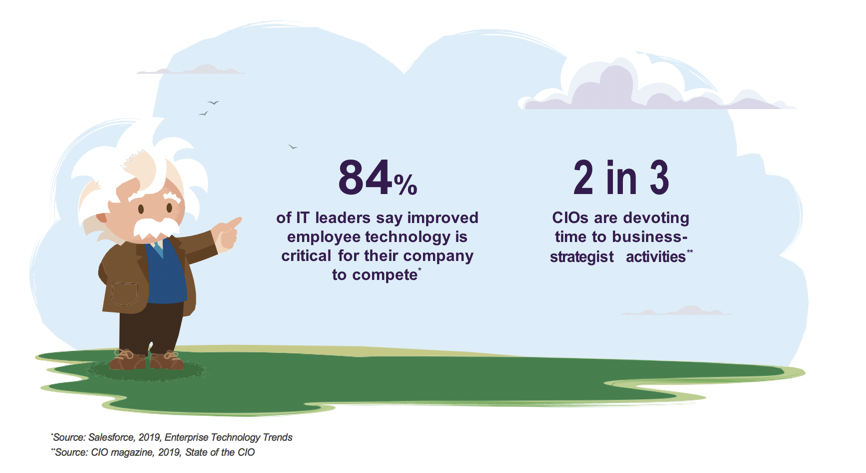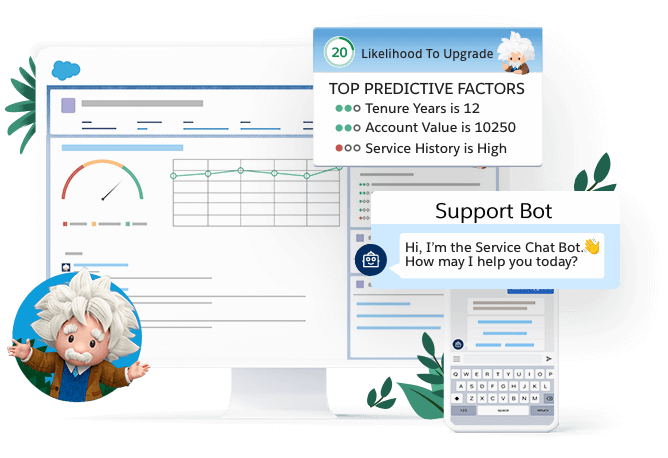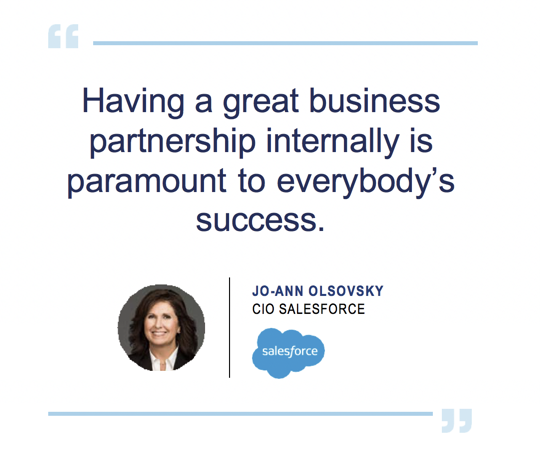In the next three minutes, you will learn how artificial intelligence (AI) is helping CIO’s power digital transformation and drive business growth.
The CIO's role is more complex than ever to stay current and up to date with technology overall. In this post, we take a deeper look into the evolving role of the CIO and how technology, AI, and machine learning (ML) are helping power digital transformation across whole organisations.
We will consider machine learning options for:
Continuous monitoring and data collection
Automating basic decision making and process flows
Improving customer experiences with the brand
The CIO: Connecting IT to the business
According to CIO Magazine's State of the CIO report, 77% of IT leaders say their team needs to be intertwined with the rest of the business. Teams must partner with other departments to unify and accelerate customer-experience efforts.
Leading organisations are turning to their IT departments to play a vital role in helping to drive business growth. And yet, as reported in our Enterprise Technology Trends research, 72% of IT leaders say that project backlogs prevent work on strategic projects.
Moving forward, IT needs to redefine its role from being the sole proprietor of how organisations develop and use technology to serve as flexible partners across the enterprise.
Today, IT should weave into the fabric of the business.
That's why we rebranded our IT department as Business Technology. It's part of every function in Salesforce, from employee engagement and recruitment to finance and sales. It's the central nervous system helping to drive business growth.
How machine learning powers the ultimate tools in business
Machine learning sounds complicated, but at its core is all about simplifying complexities. As consumer behaviours continue to evolve, ML paves the way for new, dynamic strategies. And companies need these strategies to support ongoing pivots and drive business growth.
Machine learning is an application of artificial intelligence (AI) that uses statistical models and big data to predict future trends. It can be applied across just about every industry.
CIOs using AI for marketing to deepen customer relationships by leveraging data from touch points across the client journey. AI also allows businesses to provide consumers with the personalised experiences we know they crave.
Machine learning supports the activation of insights, too. Throughout the customer journey, search data offers the best opportunity for real-time customer insights. You can automate insights and tasks, saving human capital for strategy and more creative pursuits.
Taking AI and customer interactions to new levels
In the absence of AI, centralising data from customer touch points across departments requires near-Herculean efforts. While many marketers continue to rely on in-person channels for customer service and support, they also leverage a combination of digital media.
Siloed information and inconsistent systems contribute to workplace chaos. AI works to simplify things and bridge the gaps between a customer's physical and virtual worlds. Data flows seamlessly from one channel to the next, regardless of the communication method.
For example, at Salesforce, we have taken business AI to new levels. Salesforce Einstein is the first fully inclusive, integrated AI for CRM. Einstein gives organisations the power to employ essential machine learning and deep learning concepts to all of their processes and data.
One of the most impressive capabilities of Salesforce Einstein is that it can be built into custom applications for any business, thanks to the Salesforce Platform.
Making Salesforce Einstein accessible to businesses of all sizes
We like to think of Einstein as an AI helper. It’s like a data scientist that puts the power of AI to work for companies large and small. Einstein lives and works inside your existing CRM. So there are no complex integrations or onboarding processes required for it to work for you.
AI for marketers
For marketers, this means data-backed recommendations on new marketing content, as well as when and where to publish it.
Marketers must be equipped with technology to power a 360-degree view of the customer without having to implement code or consult IT for every task.
AI for sales teams
Sales teams can benefit from AI-powered lead scoring and insights on potential opportunities. ML and AI transform the customer service experience with real-time data to power more meaningful interactions.
Einstein makes quick work of even massive amounts of customer data, with:
intelligent analysis
predictive insights
prescriptive recommendations
In truth, you can automate just about anything. But it's the layer of AI and ML that revolutionises projects, processes, and transformational outcomes.
Why AI is critical to digital transformation programs
Getting AI right is critical to the success of digital transformation programs. This not only impacts revenue and speed to market but also affects customer experiences. That's according to MuleSoft's 2020 Connectivity Benchmark Report. And having undergone our own digital transformation, we can attest to that need for integration.
At Salesforce, we knew transformational initiatives would fail if we couldn't get everyone aligned. We need our entire ecosystem to understand the bigger picture and appreciate everyone's role within it. Without that, the widespread operational change we were aiming for would be nothing but a pipe dream.
Digital transformation does not happen overnight. The best way to use IT as a lever for business growth is to do it one step at a time. This means breaking down what would otherwise be a massive project into bite-size changes across the business.
In our CIO playbook, we share a step-by-step breakdown of how our Business Technology group uses Salesforce technology and creates a culture to drive innovation and drive business growth. Learn how we improve innovation, products, and culture.







